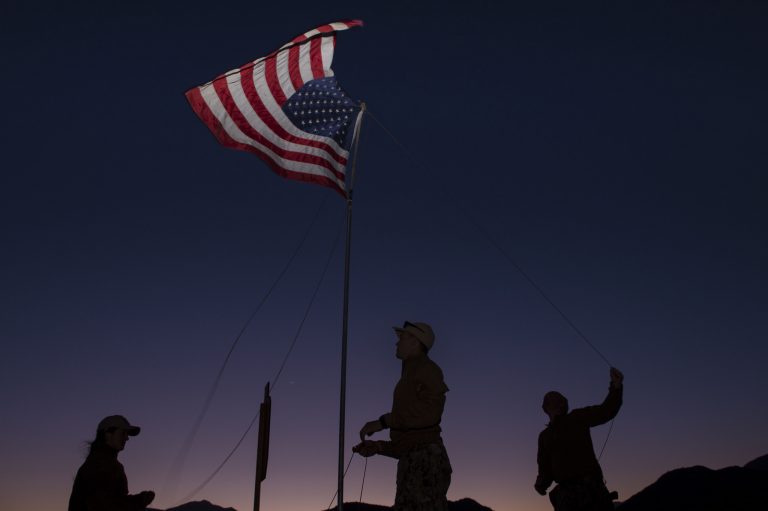
Throughout much of his late life, Elwood “Woody” Hughes wanted to honor the sacrifices of U.S. troops during the historic Battle of Iwo Jima.
To commemorate the 76th anniversary of that battle’s iconic raising of the American flag, Hughes — a Marine and veteran of the battle — had planned to raise a flag at a Lexington elementary school on Tuesday, his grandson said. Hughes, 95, died in Lexington in early February before he could raise that flag.
But in his stead, a platoon of both University of Kentucky Army and Air Force ROTC cadets raised the American flag over a snow-covered campus lawn on Tuesday in honor of Hughes and Franklin Sousley, a Kentucky native who was one of the Marines shown raising the flag over Mt. Suribachi in the iconic 1945 photo, but later died in the battle.
The ceremony at UK was in conjunction with other similar flag-raisings in honor of Hughes and other veterans on Tuesday, taking place at Veterans Park Elementary in Lexington, some schools in Germany and many schools in the Chicago area where Hughes spent much of his life as a teacher, said Steven Hughes, one of Elwood’s grandsons.
The weekslong battle for Iwo Jima, a small Pacific island south of Japan, was among the bloodiest of the Second World War. Nearly 18,500 Japanese soldiers and 6,800 U.S. Marines were killed. Many today still know the battle through the iconic Joe Rosenthal photograph of U.S. Marines raising the American flag over Mt. Suribachi, the island’s highest point.
“While we are a long way from Mt. Suribachi, the importance of the flag raising there that day more than 75 years ago, is still just as significant today,” said UK Provost David Blackwell. “The historic photo symbolizes the heavy truth of war, recognizing one of the bloodiest battles in World War Two, and depicting the US Marines of the 28th regiment, fifth division.”
Elwood arrived on Iwo Jima on Feb. 22, 1945, a day before the flag-raising, he told the American Veterans Center in a June 2020 interview. On the island he worked as a runner or “gopher,” delivering important communications and information. Upon landing at Iwo Jima, Elwood said he remembered the artillery, the “rat-a-tat-tat” of machine gun fire and that some Japanese artillery could reach the command center.
Steven said his grandfather was a natural communicator and storyteller and loved to honor people through talking about them. But Elwood didn’t tell many stories about the war until much later in his life, Steven said, “because he realized a lot of people wanted to hear those stories.”
“He was a storyteller,” said Steven, a high voltage utility manager at UK who attended the ceremony. “That’s how he honored people. And I’m honored to do that for him.”
Elwood said in his online interview that he wanted to talk about his experiences on Iwo Jima in honor of those who never left the island.
“They kind of treat people like me as a celebrity and a hero,” Elwood said. “I feel I’m not. I shouldn’t be. Because the heroes never walked off Iwo Jima.”
Growing up, Steven said he knew his grandfather for his prized rose bushes and his prepared but easygoing nature. Over concerns related to the pandemic, Elwood moved to Lexington for about the last seven months of his life to be closer to family who could care for him. When he came to Kentucky, he even visited the grave of Sousley, a native of Fleming County.
After his death, Luke Eiden, a UK sophomore and family friend, reached out to university administrators about potentially having the ceremony.
___
(c) 2021 the Lexington Herald-Leader
Distributed by Tribune Content Agency, LLC.
0 comments :
Post a Comment